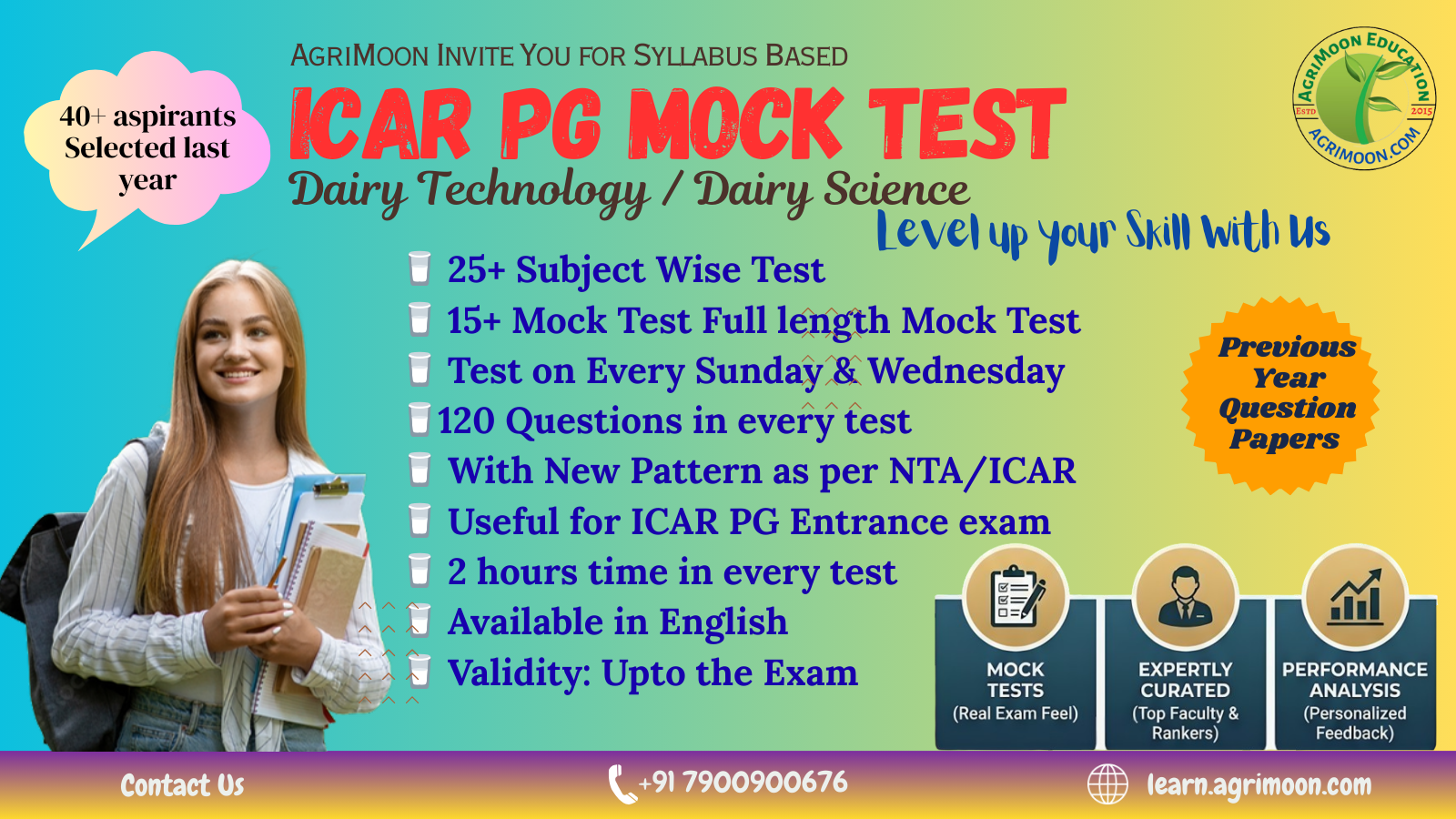Code 03: MAJOR SUBJECT GROUP – PHYSICAL SCIENCE
(Sub-Subjects: 3.1: Agricultural / Agro. Meteorology, 3.2 : Soil Science & Agricultural Chemistry/ Soil Conservation and Water Management/ SWC/ Irrigation and Water Management, 3.3: Agricultural Physics, 3.4: Agricultural Chemicals, 3.5: Environmental Science.)
UNIT-I: Importance of Agriculture in national perspective; basic principles of crop production, diversification, diversification of Agriculture, principle of nutrient and water management, package of practices for rice, wheat sorghum, maize, chickpea, pigeon pea, potato, sugarcane, groundnut, major vegetable crops. Role of essential plant nutrients, their deficiency symptoms and management options. Structure and function of plant cells, cell division, Basic concept of plant physiology relating to crop production- Biochemical compounds viz, carbohydrates, proteins, enzymes, fats, liquid vitamins and their function, developmental programmes relating to rural upliftment and livelihood security; organisational set up of agricultural education research and extension and future strategies for up gradation.
UNIT-II: Volumetric and gravimetric analysis including complexmetric methods, periodic classification of element, Basic principle of instrumental analysis including spectro-photometry (Absorption and emission spectrography), Atomic structure –elementary concept of radioactivity, element and compound common ion effect, solubility product— hydrolysis of salts, buffer solution indicates equivalent weights and standard solution.
Elementary concepts of organic compounds- nomenclature and classifications including hydrocarbons, alcohol, aldehydes, acids and esters, carbohydrates, fats and liquids, amino acids, nucleic acids. Pesticides, their classification and uses; biopesticides and botanical pesticides.
ICAR Exam Syllabus For PG Plant Biotechnology & Plant Science
UNIT-III: Soil as a medium for plant growth, composition of earth’s crust, weathering of rocks and minerals, components of soil- their importance, soil profile, soil partials- physical mineralogical and chemical nature. Mechanical analysis, Stokes law, assumptions, limitations and applications. Soil, physical properties- density, porosity, texture, soil structure and their brief descriptions. Rheological properties in soils, calculations of porosity and bulk density. Soil air-Aeration, causes of poor aeration, factors affecting aeration, importance for plant growth. Soil temperature – sources and losses of soil heat. Factors affecting soil temperature, its importance in plant growth. Soil water- structure of water, soil-water-energy relationship, classifications, surface tension and movement in soil. Soil colloids- properties, structure of silicate clay minerals, sources of negative charges, properties, kaolinite, illite, montmorillonite and vermiculite clay minerals, milli-equivalent concept , cation exchange capacity, anion exchange capacity, buffering of soils. Problem soils- acid, saline, sodic and acid sulphate soils – their characteristics, formation, problems and management. Irrigation, water quality and its evaluation. Waterlogged soils- basic features, distinction with upland soils.
UNIT-IV: Essential plant nutrients- criteria of essentiality, functions for plant growth, mechanisms for movement and uptake of ions in soils and plants, Forms of nutrients in soils, deficiency symptoms on plants, luxury consumption, nutrient interactions and chelated micronutrients. Soil fertility, evaluation and management for plant growth, soil testing and fertilizer recommendations. Soil classifications- diagnostic surface and sub- surface horizons, soil survey- types, objectives, uses, land capability classifications. Remote sensing and its application in agriculture, SIS, GIS and GPS- basic features and uses in agriculture, Elementary concepts of radio isotopes and uses in agriculture. Soil micro-organisms, Classifications and their roles. Organic matter- decomposition, C:N ratios, mineralization and immobilization processes, humus, role of organic matter in soil quality. Soil erosion, types and control measures. Fertilizers and manures- classifications, NPK fertilizers, their reactions in soils, green manuring, recycling of organic wastes, composting. Soil and water pollution- sources, brief idea about different pollutants in soils and their managements
For Daily Update follow us at:
Facebook Telegram Whatsapp Instagram YouTube
If you are facing any Problem than fill form Contact Us or send Mail at info@agrimoon.com



[…] Click Here […]